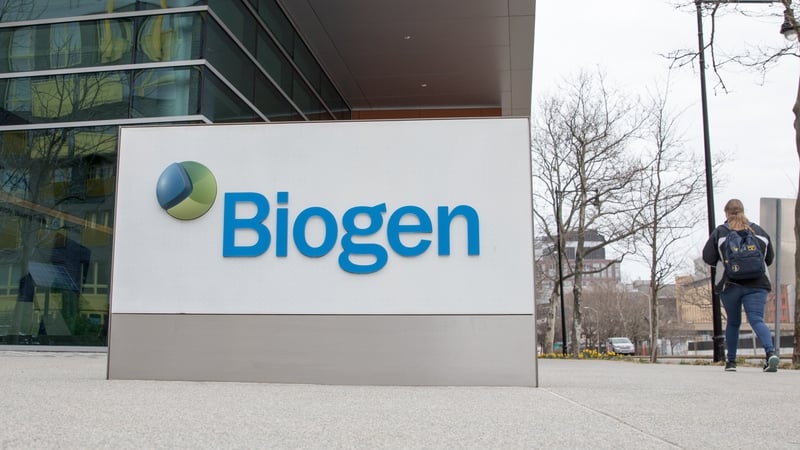US regulators have approved Biogen's aducanumab as the first treatment to attack a likely cause of Alzheimer's disease, sending its shares soaring, despite controversy over whether the clinical evidence proves the drug works.
Biogen said it has priced the drug, to be sold as Aduhelm, at $56,000 per year. Its shares jumped nearly 52% to $434.52 when trading resumed following the approval. US-traded shares of partner Eisai Co were already up $33.50, or 45%, to $107.75
Aducanumab aims to remove sticky deposits of a protein called amyloid-beta from the brains of patients in earlier stages of Alzheimer's in order to stave off its ravages, which include memory loss and the inability to care for one's self.
"This is good news for patients with Alzheimer's disease. We've not had a disease-modifying therapy approved ever," said Dr Ronald Petersen, an Alzheimer's disease expert at the Mayo Clinic.
However, he cautioned, "This is not a cure. It's hoped that this will slow the progression of the disease."
"It think this is a big day," Dr Peterson said. "But we can't over-promise."
Alzheimer's is the sixth-leading cause of death in the United States.
The Food and Drug Administration on its website noted that trials data for the treatment was complicated with respect to clinical benefits, but added that it "has determined that there is substantial evidence that Aduhelm reduces amyloid-beta plaques in the brain and that the reduction in these plaques is reasonably likely to predict important benefits to patients."
Biogen's drug had been hailed by patient advocates and some neurologists eager to have an effective option for patients with the lethal disease. Other doctors said clinical trial results were inconsistent and more proof was needed.

"I'm surprised and disappointed," said Dr Caleb Alexander, a drug researcher at Johns Hopkins who was on the FDA's advisory committee that voted against approval of Biogen's drug.
"It's hard to find a scientist, even one with ties to the manufacturer, who believes the totality of the evidence is persuasive."
US health insurers and the US government's Medicare programme will bear most of the cost of the drug, whose price will vary based on dosage and discounts.
Aducanumab was studied in patients with early disease who test positive for a component of amyloid brain plaques, but the FDA approval does not indicate that it is for a specific group of patients.
That raises the possibility that the treatable population could be larger than anticipated.
Still, most insurers are likely to limit their coverage of the drug to the type of patients who participated in the trial, said Steve Miller, chief clinical officer at health insurer Cigna Corp.
He estimated that 85% to 90% of US patients eligible for the drug are covered by Medicare.
"I would be very surprised if any payer, including Medicare, made it available for a broader population than the study population," Mr Miller said.
The FDA said Biogen will need to conduct a post-approval trial to verify Aduhelm's clinical benefit, and that it could be pulled from the market if the drug does not work as intended.
"I think they made the right decision. It makes the drug available to patients while requiring the company to do more research to prove its benefit. I think it's a win-win for all," said Dr Howard Fillit, chief science officer of the Alzheimer's Drug Discovery Foundation.
Some trial patients experienced potentially dangerous brain swelling. The FDA advised that patients who experience the side effect should be monitored but not necessarily taken off the drug.
Biogen has estimated that around 1.5 million Americans would be eligible for treatment with aducanumab, which is given by monthly infusion, raising concerns about costs to the health care system.
The number of Americans living with Alzheimer’s is expected to rise to around 13 million by 2050 from more than 6 million currently, according to the Alzheimer’s Association.
"We think the drug has the potential to generate (at least) $10 billion in peak sales, and believe a successful launch of aducanumab has the potential to completely change the profile of the company," said Guggenheim analyst Yatin Suneja.
The medicine is seen as critical to Biogen's revenue growth prospects as competition has hurt sales of its mainstay multiple sclerosis drug, Tecfidera, as well as its other growth driver, Spinraza for spinal muscular atrophy.
Wall Street analysts had forecast that an FDA approval ofBiogen's drug could reinvigorate a field that has been abandoned by many large pharmaceutical companies after a long string of failures. Current treatments only try to alleviate symptoms.
Shares of companies developing Alzheimer's treatments also jumped, with AC Immune SA and Anavex Life Sciences up between 14% and 17%, while shares of Eli Lilly and Co and Axsome Therapeutics rose more than 5%.

